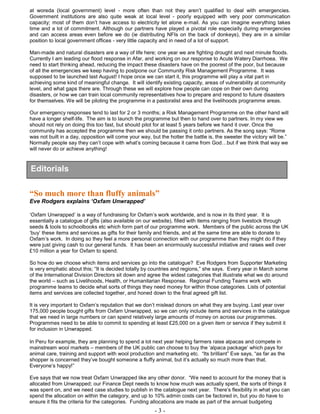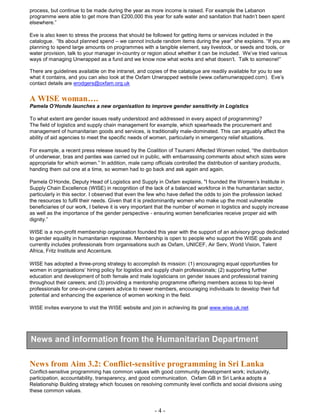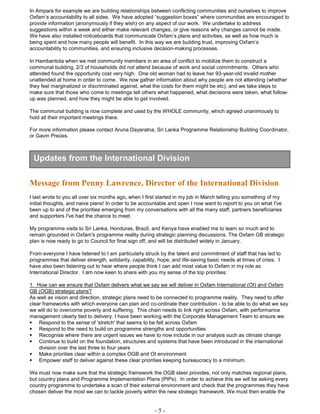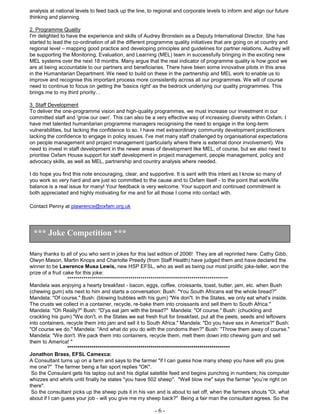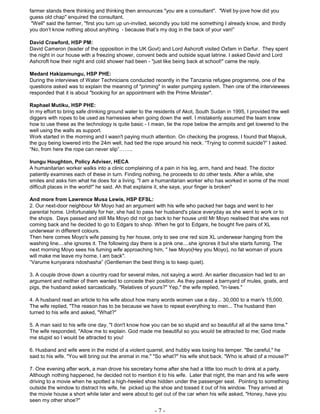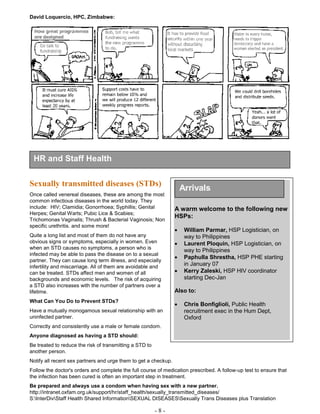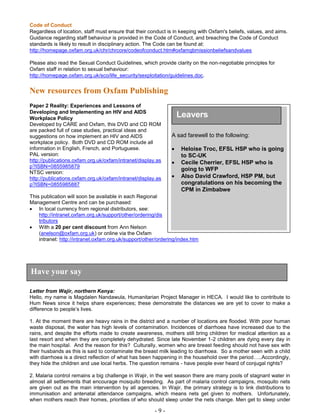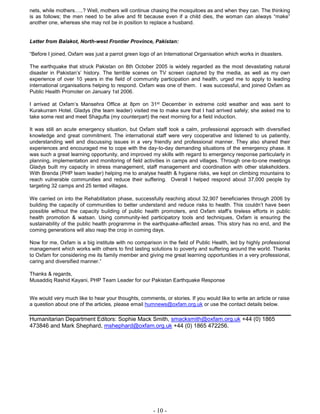- Lawrence Musa Lewis, the new HSP for Food Security and Livelihoods at Oxfam, discusses the challenges of working in Zimbabwe, including a lack of funding for long-term development programs from donors and the need for better coordination between organizations. He provides an example of how Oxfam programs positively impacted an elderly woman but she ultimately died from malaria, highlighting the need to address underlying causes of poverty.
- Kebede Molla, who has worked with Oxfam in Ethiopia for 20 years, discusses the challenges of frequent natural disasters interfering with long-term development work and the weak capacity of local governments. He hopes a new Community Risk Management Program can help communities better prepare for and respond to disasters
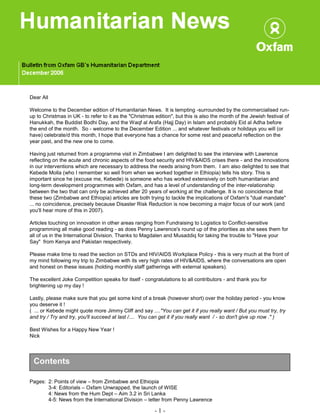
![- 2 -
6-7: Joke competition – the winner is announced!
8-9: Staff Health, leavers and arrivals
9: Have Your Say – letters from Magdalen Nandawula and Musaddiq Rashid Kayani
Zimbabwe and beyond
Hayley Duffell interviews Lawrence Musa Lewis, new HSP for Food Security and Livelihoods (EFSL HSP),
about his previous work
Lawrence is a quietly spoken man but has lots to say about our work in Zimbabwe. Formerly the Livelihoods
Programme Manager there, he is embarking on a 5-month HSP role. “This is part of the development of my
professional career. I really love Oxfam. I strongly believe in its policies, it’s unjust for people to suffer. The
HSP role gives me an opportunity to gain experience of Oxfam at a global level. It’s an opportunity to learn from
others and share what I have learned, and what I will learn, with others.”
He was excited to have the opportunity while visiting the Oxford office to meet and work with advisers, and felt
he contributed to documents being produced. “Even during the induction I have learned a lot, it is intense and
comprehensive, rather like doing a Masters! I have met so many people, got abreast of current trends in field
programmes, and can do the context analysis that we don’t get a chance to do in the field.”
Lawrence explains that one of the challenges of working in Zimbabwe is an apparent lack of will on the part of
donors (mostly western governments) to fund long-term programmes. “We do an assessment, get feedback
from communities on how to address their chronic problems, but the funding available is only for emergencies.”
Also, work is constantly geared towards donor targets and there is “no time to give feedback to the communities
for reflecting and lesson-learning and then incorporating this into new work. This needs to be implemented in all
aspects of programmes.” He goes on: “We have really competent and dedicated advocacy staff but we need
more coordination with the Government and other agencies. We should be asking: We are trying to address
chronic poverty year after year… how can we help each other?” Lawrence believes more dialogue is needed,
and suggests advocacy training for other agencies… “Oxfam needs to share the knowledge it has so others can
push advocacy issues as well.”
There is continual deterioration of the food security situation in Zimbabwe. Until 2002, drought recurred once
every ten years; “it is now more frequent, increasing the level of chronic poverty and peoples’ food-insecurity.”
The prevalence of HIV and AIDS “has meant fewer agricultural workers, so less food planted and harvested.”
Also, government policies have failed to support NGOs and other institutions to fund food and livelihoods
programmes. “There are strained relations between the Zimbabwean Government and other countries,” muses
Lawrence. He stresses the need for proper investment in long-term development and infrastructure, by both the
Government and NGOs. “Our programmes have lots of positive impacts on people. But we are coming in year
after year addressing symptoms of poverty rather than the underlying causes. During the huge drought in 2002,
all aspects were compounded and made life worse. There was a decrease in livestock and agricultural
production.” Emergency food aid was provided and the markets began to recover. Now, we distribute vouchers
in order to support the markets and our programmes include livelihoods, public health, HIV awareness and
providing access to clean water.
Lawrence tells the story of an old woman he visited in November 2005 who had lost her son and daughter-in-law
to AIDS, and now looked after her very sick grandson. She was given an animal to help plough her land and
received 5kg of maize and 10kg of fertilizer. “You could see her face was very radiant when she spoke about
how Oxfam helped her… In January 2006, she had a good crop and was expecting a good harvest.” But before
the harvest she became ill and did not accept help from her neighbours, and she died from malaria. “It really
broke my heart.” Lawrence says, “People [working for Oxfam] should not tire in what they are doing, they are
really making a change. Feel very encouraged about what you are doing to fight poverty.” He says, “don’t be
discouraged by the challenges faced, we should continue, as we are making a positive impact.”
Trying to take a longer term view in Ethiopia
Maite Alvarez interviews Kebede Molla – Humanitarian Programme Officer with Oxfam for 20 years.
My role is to encourage and support communities to identify their own problems and find a solution by
themselves, instead of us doing assessments and always coming up with answers. Oxfam’s role, and mine, is to
advise as much as we can, and only ‘do’ when communities don’t have any other options. However, I think
international organisations like us have distorted people’s ways of living due to too much external, culturally
insensitive intervention, increasing their dependence on us. Another problem is that there isn’t enough capacity
Points of View from around the world](https://image.slidesharecdn.com/d5011d88-493a-4775-9615-ae179906c7f4-160204064737/85/Edition-8-December-06-2-320.jpg)
